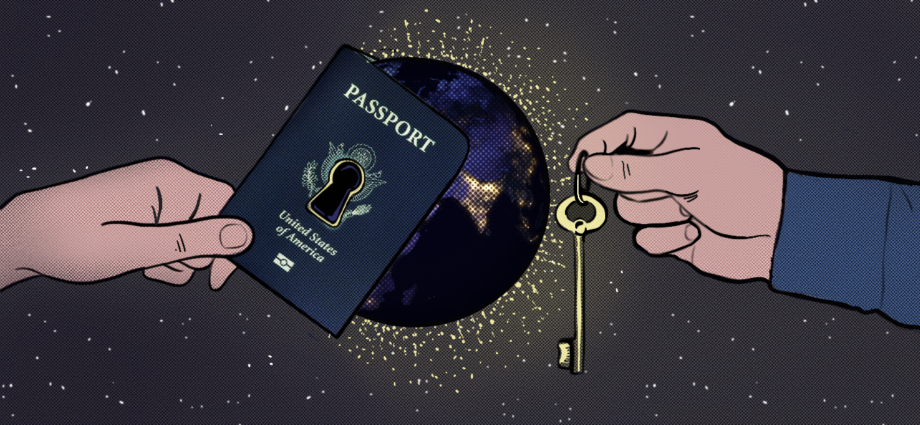By Kayla Sagiz
Passport privilege is like a golden ticket to the world, giving you all the benefits of high global mobility. However, if you hold a low-privilege passport, you face all sorts of obstacles when trying to travel, study, work, or live abroad. It’s like the international community is playing a rigged game, with winners and losers being determined by which passport one has. These restrictions don’t just hurt individuals, they hold back entire countries, and the magnitude of this problem cannot be overlooked. The disparity is striking, with some passports granting access to only a few countries, while others provide a passport utopia.
According to the Henley Passport Index, a Somali passport can take you to 34 destinations on a visa on arrival, while those from Japan or Singapore can travel to 192 states freely.
Those with “low privilege” passports often find themselves subjected to suspicion and fear. They face questions like ‘What are you looking for in our land of milk and honey?’ ‘Are you sure you won’t overstay?’ ‘What does your medical record look like?!’ The need to repeatedly prove oneself to receive basic treatment is bewildering, and frustrating, yet it still persists in this “era of progress.” It’s time to acknowledge and address this unequal distribution of power, and end this institutionalized form of cultural and racial othering. To gain a deeper understanding of this issue, I gathered interviews with those who have experienced the challenges of passport privilege firsthand.
Ayan, from India, shares an experience where him, and his Pakistani friend were separated from their European colleagues while traveling from Abu Dhabi to the US during a school trip. Ayan shares that they underwent an extensive review, spent 30 minutes in a room with others from South Asia and the Middle East, risking missing their flight. He also brings up the issue of the Dutch government’s tuberculosis test requirement for nationals of certain countries. Despite not having visited India in the past five years, Ayan questions the necessity of undergoing a tuberculosis test. He points out that “simply by virtue of having an Indian passport, I am supposed to travel to a different city and undertake a test.” Rashi, also from India shares her frustration with “random” check-ups, difficulty in getting a visa, and higher tuition fees.
In an interview, Nwaka, who has both Nigerian and British passports, shares a vivid account of her father’s journey to reunite with his family in England. Despite having a pregnant wife and two children there, he was initially denied permission. Nwaka expresses disbelief at officials questioning the legitimacy of their marriage and finding irrelevant reasons to prevent his departure. Ferdinand Omanyala, also known as “the fastest man of Africa” failed to obtain a US visa on time to travel to the 2022 World Athletics Championships. Although he managed to obtain the visa just 24 hours before his race, the stress and inconvenience undoubtedly had a negative impact on his performance.
Additionally, the financial burden placed on individuals from low-privilege passport countries adds another layer of inequity. Visa application fees, travel insurance requirements, and the need to provide proof of financial means can create significant barriers, further limiting their opportunities and exacerbating the existing inequalities. Due to stark wealth imbalances and persistent inequality, many do not even have the luxury of being concerned with passport privilege. And those who have the financial means to go abroad find themselves held back solely due to the limitations of their passport.
While a privileged passport may facilitate easier travel and access to certain opportunities, it fails to address the deeply rooted biases and prejudices ingrained in social interactions and institutional systems. Discrimination persists regardless of passport status, as it is embedded in society beyond surface-level benefits. For example, Joanna, from Poland, highlights that despite her “privileged” passport, she encountered discrimination while trying to collect a package. This example illustrates the disconnect between institutional and social othering in the context of passport privilege. While a privileged passport may facilitate travel and opportunities, it doesn’t address the deeper biases ingrained in society.
To combat discrimination effectively and foster a more inclusive society, it is crucial to acknowledge and address the underlying causes that perpetuate bias and prejudice beyond the advantages provided by a privileged passport. The current passport privilege system, influenced by historical colonialism, economic power imbalances, and geopolitical factors, has resulted in unequal opportunities based on nationality. Governments and policymakers must actively confront and dismantle the deeply ingrained biases in social interactions and institutional systems by creating more inclusive and accessible immigration policies that prioritize fairness over nationality. This means reevaluating visa systems, simplifying bureaucratic processes, and establishing clearer pathways to global mobility. It is essential to recognize and challenge the deep-seated biases that transcend the superficial benefits of passport privilege, dismantling discriminatory systems in the process.
Edited by Uilson Jones, artwork by Vanessa Franko

